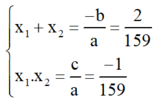với giá trị nào của x thì biểu thức sau \(\sqrt{\dfrac{2x}{3}}\) không có nghĩa :
A. x ≤ 0
B. x ≥ 0
C. x < 0
D. x > 0
phương trình \(\sqrt{x}\)=a vô nghiệm với
A. a = 0
B. a < 0
C. a > 0
D. mọi a
Hãy nhập câu hỏi của bạn vào đây, nếu là tài khoản VIP, bạn sẽ được ưu tiên trả lời.

a, \(sin^2x-4sinx+3=0\)
\(\Leftrightarrow\left(sinx-1\right)\left(sinx-3\right)=0\)
\(\Leftrightarrow sinx=1\)
\(\Leftrightarrow x=\dfrac{\pi}{2}+k2\pi\)
b, \(2cos^2-cosx-1=0\)
\(\Leftrightarrow\left(cosx-1\right)\left(2cosx+1\right)=0\)
\(\Leftrightarrow\left[{}\begin{matrix}cosx=1\\cosx=-\dfrac{1}{2}\end{matrix}\right.\)
\(\Leftrightarrow\left[{}\begin{matrix}x=k2\pi\\x=\pm\dfrac{2\pi}{3}+k2\pi\end{matrix}\right.\)

Bài 3:
b: \(\Leftrightarrow x^2\left(x+1\right)^2=0\)
hay \(x\in\left\{0;-1\right\}\)
c: \(\Leftrightarrow\left(x-1\right)\left(x^2+x+1\right)=0\)
=>x-1=0
hay x=1
d: \(\Leftrightarrow6x^2-3x-4x+2=0\)
\(\Leftrightarrow\left(2x-1\right)\left(3x-2\right)=0\)
hay \(x\in\left\{\dfrac{1}{2};\dfrac{2}{3}\right\}\)

a) Phương trình 4 x 2 + 2 x − 5 = 0
Có a = 4; b = 2; c = -5, a.c < 0
⇒ Phương trình có hai nghiệm x 1 ; x 2
Theo hệ thức Vi-et ta có: 
b) Phương trình . 9 x 2 − 12 x + 4 = 0
Có a = 9; b' = -6; c = 4 ⇒ Δ 2 = ( - 6 ) 2 - 4 . 9 = 0
⇒ Phương trình có nghiệm kép x 1 = x 2 .
Theo hệ thức Vi-et ta có: 
c) Phương trình 5 x 2 + x + 2 = 0
Có a = 5; b = 1; c = 2 ⇒ Δ = 1 2 − 4.2.5 = − 39 < 0
⇒ Phương trình vô nghiệm.
d) Phương trình 159 x 2 − 2 x − 1 = 0
Có a = 159; b = -2; c = -1; a.c < 0
⇒ Phương trình có hai nghiệm phân biệt x 1 ; x 2 .
Theo hệ thức Vi-et ta có: 

a) \(x^3-x^2+3x-3>0\)
\(\Leftrightarrow x^2\left(x-1\right)+3\left(x-1\right)>0\)
\(\Leftrightarrow\left(x^2+3\right)\left(x-1\right)>0\)
Mà: \(x^2+3>0\forall x\)
\(\Leftrightarrow x-1>0\)
\(\Leftrightarrow x>1\)
b) \(x^3+x^2+9x+9< 0\)
\(\Leftrightarrow x^2\left(x+1\right)+9\left(x+1\right)< 0\)
\(\Leftrightarrow\left(x^2+9\right)\left(x+1\right)< 0\)
Mà: \(x^2+9>0\forall x\)
\(\Leftrightarrow x+1< 0\)
\(\Leftrightarrow x< -1\)
d) \(4x^3-14x^2+6x-21< 0\)
\(\Leftrightarrow2x^2\left(2x-7\right)+3\left(2x-7\right)< 0\)
\(\Leftrightarrow\left(2x^2+3\right)\left(2x-7\right)< 0\)
Mà: \(2x^2+3>0\forall x\)
\(\Leftrightarrow2x-7< 0\)
\(\Leftrightarrow2x< 7\)
\(\Leftrightarrow x< \dfrac{7}{2}\)
d) \(x^2\left(2x^2+3\right)+2x^2>-3\)
\(\Leftrightarrow2x^4+3x^2+2x^2+3>0\)
\(\Leftrightarrow2x^4+5x^2+3>0\)
\(\Leftrightarrow\left(x^2+1\right)\left(2x^2+3\right)>0\)
Mà:
\(x^2+1>0\forall x\)
\(2x^2+3>0\forall x\)
\(\Rightarrow x\in R\)
a: =>x^2(x-1)+3(x-1)>0
=>(x-1)(x^2+3)>0
=>x-1>0
=>x>1
b: =>x^2(x+1)+9(x+1)<0
=>(x+1)(x^2+9)<0
=>x+1<0
=>x<-1
c: 4x^3-14x^2+6x-21<0
=>2x^2(2x-7)+3(2x-7)<0
=>2x-7<0
=>x<7/2
d: =>x^2(2x^2+3)+2x^2+3>0
=>(2x^2+3)(x^2+1)>0(luôn đúng)

a ) x ∈ ℤ , x < 0 b ) x = 0 c ) x ∈ ℕ *
d) x = 5
e) x ∈ {1;2;3;4}
f) x ∈ {6;7;8;9;10}

Đáp án D là đáp án đúng
Thế tọa độ O lần lượt vào các đáp án thì A: \(2\le0\) (sai), B: \(2\le0\) (sai), C:\(-2\ge0\) (sai)
D: \(2\ge0\) (đúng)
1.C
2.B